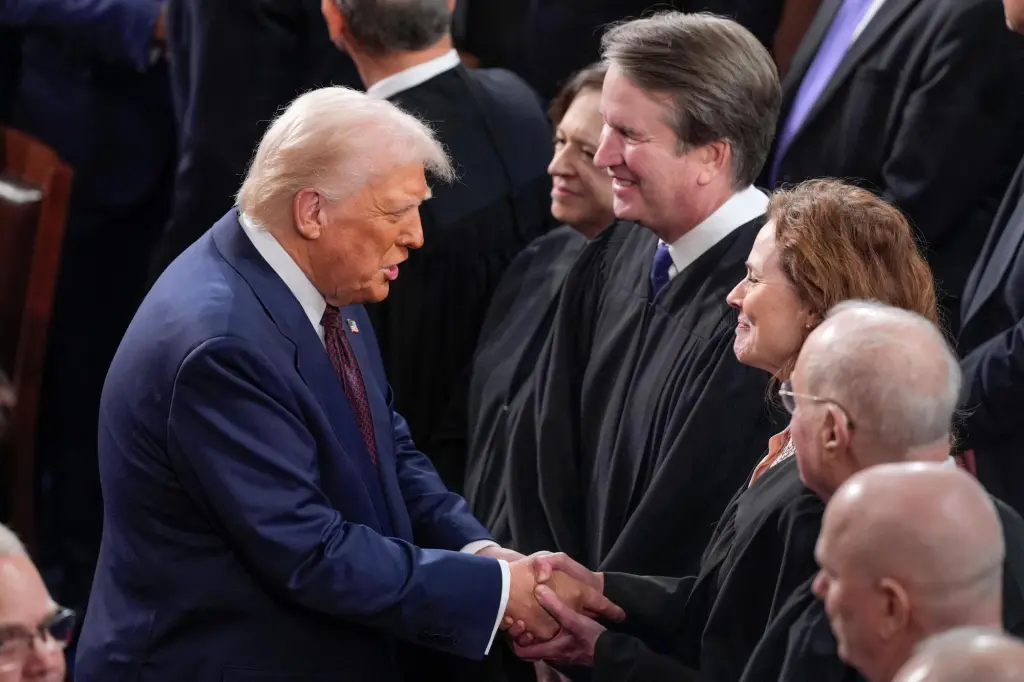Copyright Baltimore Sun

Justice Amy Coney Barrett was appointed by President Donald Trump in 2020 after serving three years on the United States Court of Appeals for the Seventh Circuit. What inspired the associate justice to pick up the pen with her new memoir, “Listening to the Law,” is unclear. Her book breaks no new ground. Its description of the judicial process and the functioning of the Supreme Court is jejune to the schooled. Justice Barrett purports to worship textualism as the touchstone of constitutional interpretation. But she joined the counter-textual majority opinion of Chief Justice John Roberts in Trump v. United States to summon into being presidential immunity for crimes committed in the White House, for example, dispatching SEAL Team Six to assassinate a political opponent, or murdering suspected international drug traffickers with the armed forces. J. Michael Luttig, former renowned conservative of the United States Court of Appeals for the Fourth Circuit, assailed the extra-constitutional ruling as “abominable.” Justice Barrett’s anemic defense of overruling the constitutional right to an abortion in Dobbs v. Jackson Women’s Health Organization (2022) fails to persuade. The court’s opinion creating the right in Roe v. Wade (1973) nearly 50 years earlier was admittedly intellectually thin. I believe the case was wrongly decided. But numerous Supreme Court precedents are ill-conceived. As Justice Robert Jackson pointed out in Brown v. Allen (1953), “We are not final because we are infallible, but we are infallible only because we are final.” The rule of law, however, requires predictability. It is inconsistent with treating precedents like restricted railroad tickets good for this train and day only. That understanding finds expression in the doctrine of stare decisis. The court will not revisit a decision except in extraordinary circumstances — like a once-in-a-200-year storm. Supreme Court blunders can be corrected by constitutional amendment under Article V. Amendments 11, 14, 16, 19 and 26 were ratified to reverse Supreme Court decisions. During the long decades that post-dated the Roe precedent, no constitutional amendment had been proposed by Congress for ratification by state legislatures to challenge Supreme Court precedent. Vocal opponents of abortion persisted. Some even turned to violence. While Justice Barrett purports to shun judicial subjectivity, she proffers no objective standards for determining whether a precedent should be overruled. It calls to mind George Orwell’s “Animal Farm”: “All animals are equal, but some are more equal than others.” Justice Barrett’s greatest shortcoming is failing to recognize the philosophical assumptions that informed the drafting and ratification of the Constitution. The Declaration of Independence marked a break in history in stipulating that the purpose of any government arrangement was to secure unalienable individual rights to life, liberty and the pursuit of happiness, i.e., wisdom and virtue. These rights were not bestowed by government. They were natural rights anterior to and independent of any government dispensation. They were to be shared equally by all. Thus, the opening lines of President Abraham Lincoln’s electrifying Gettysburg Address: “Four score and seven years ago, our fathers brought forth on this continent a new nation, conceived in liberty and dedicated to the proposition that all men are created equal.” James Madison added in Federalist 51 that “justice” is the end of government and civil society. Liberty and justice find expression in the opportunity of everyone to march to his own drummer free from domestic predation or foreign aggression, the opportunity to develop their faculties and pursue their ambitions without encroaching on the equal rights of others. As then-Secretary of State John Quincy Adams elaborated in his July 4, 1821, address to Congress, the glory of the United States was liberty and the march of the mind, not government power seeking world domination by force of arms. The Constitution makes democracy or majority rule subservient to liberty and justice. More than a dozen constitutional provisions reject democracy by handcuffing majorities to fortify liberty, for example, the Electoral College, equal representation of states in the Senate, or supermajorities for constitutional amendments. Thomas Jefferson disparaged an “elective despotism” in his “Notes on Virginia,” amplifying, “173 despots would surely be as oppressive as one. Let those who doubt it turn their eyes on the republic of Venice.” The Constitution’s separation of powers is its crown jewel — a structural bill of rights to protect the people from tyranny by preventing any political faction from acquiring unchecked power to oppress rivals. Any constitutional interpretation at odds with liberty or justice is inherently suspect. It should be rejected unless necessary to prevent the nation from imminent extinguishment by force or violence. Government and government officials should be held to greater constitutional accountability than private citizens. No immunity from criminal prosecution or civil liability. The Constitution should be construed to endow every citizen with a private right of action to redress injuries caused by violations against the offending official. No claims of state secrets or executive privilege should be permitted to defeat justice. Transparency should be the coin of the realm. Justice Louis D. Brandeis underscored that point in his dissent in Olmstead v. United States (1928), “Our Government is the potent, the omnipresent teacher. For good or for ill, it teaches the whole people by its example. Crime is contagious. If the Government becomes a lawbreaker, it breeds contempt for law; it invites every man to become a law unto himself; it invites anarchy.” We urgently need deliverance from rampant government lawlessness. Justice Amy Coney Barrett is not our judicial savior. Bruce Fein was associate deputy attorney general under President Ronald Reagan and is author of “American Empire Before the Fall.” His website is www.lawofficesofbrucefein.com and X feed is @brucefeinesq.



